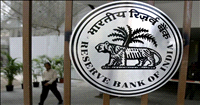Current correction an intermediate bear market: Faber
08 Jun 2006
| Investment analyst, Dr Marc Faber feels that the current correction is more likely to be an intermediate bear market and that markets may drop further even after a rebound.Faber feels the Sensex may go to 6,000-8,000 levels in the medium term. He further states that most equity markets may have seen the highs for the year.
|
Is this just a vicious bull market correction or is this a bear market? What is your gut feeling?
My feeling is that it is more likely to be an intermediate bear market. We had euphoria, very low volatility and deterioration in the technical underpinnings of the markets. So we have sold off considerably; by more than 20 per cent in some cases like India.
The markets are becoming rapidly oversold and there could be a rebound at some point. After that, it will go still lower. We obviously do not know how low it will go at this point but I think that the upside in an event is extremely limited.
You said you sold off almost 20 per cent or more in markets like India. What specifically is your outlook for Indian equities? Where could the Sensex find it's low and would you continue to be a seller in the Indian market?
Well, I've sold already so it's not the question for me. But my feeling is that India will go down to somewhere around 6,000-8,000.
Has the entire picture, in terms of risk aversion, changed now? You had earlier made a point of India as an asset class, has that changed?
No. Not at all. But you can still have an asset class whether it's India or gold having a 40 per cent correction. A very significant correction will not surprise me. In 1987, the US stock market dropped between August and October by 40 per cent and it still went up 7 times.
The global economy is right now in a boom condition but we have a tightening of liquidity not necessarily induced by central banks but because this must be good. In other words, we have a very high level of consumer spending. In an emerging economy, it's a very high level of capital investments. So, the money is being drained out of financial assets into the real economy.
A good example of that is the Middle East. In the Middle East, there were rising oil prices and rising production between 1999 and 2005. And in 2005, oil production began to stall. Since then, oil prices have remained at the same level. So, we have lots of liquidity. But the rate of increase in liquidity had slowed down and the markets went down 50 per cent.
What do you expect to see in equity markets in the next few months because now it is not just emerging markets… we are hearing the word capitulation being used for developed markets as well?
I do not see capitulation in the sense that the majority of investors are not looking at selling but they are looking at buying. The decline has obviously caught many investors by surprise. Investors are totally ignorant because they believe that the market will go up forever without any correction.
In America, since October 2002, we had the third-longest stretch over the rising market without a 10-per cent correction. This declining volatility in the market since 2003 had misled many investors into believing that markets do not have downside risks anymore, and that is inherent in the capital existence.
So, there is volatility, business expansions and contractions and there are markets that go up and then correct. The market in India has not peaked out for good because fundamentally, the potential of the Indian economy is very good in the long run. You can have very significant correction and it may take a while until you make a new high.
Looking at fundamentals, global liquidity conditions, how long could this bearish phase last in a market like India?
We have seen the highs for the year in most equity markets. The equity markets run into some seasonal strength towards the end of June-July. In other words, we will have the rebound shortly. Thereafter, it will go down again until around October or November. I have advised clients to essentially take a holiday.













.jpg)






.jpg)









